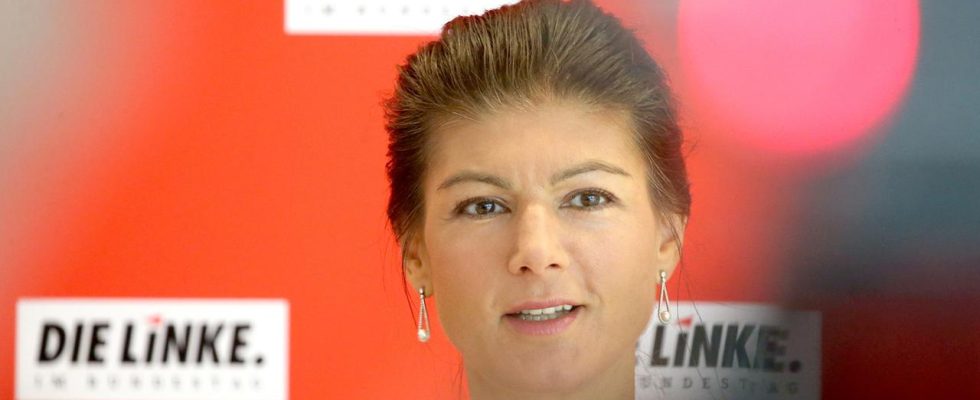analysis
The separation between the Left Party and Sahra Wagenknecht is painfully tough. To the detriment of the left. A final break could also be an opportunity for both sides.
For many years, the Left Party has claimed the title of “People’s Party,” at least in East Germany. However, if you ask around the country now, it doesn’t seem as if the left is a party that is particularly well received.
In the small town of Brandenburg, for example, a young man complains that he no longer sees the left in town. AfD representatives are everywhere, but the left is nowhere. An older passer-by says that she hears so little from the party at the moment. It used to be different. The left only perceives her because she is in an argument with Sahra Wagenknecht, adds another woman.
No profile, a lot of arguments
No profile, not enough presence and, above all, divided, so the unanimous verdict. It has been almost two years since the left almost experienced an electoral debacle in the federal election. Only three direct mandates helped her narrowly get into parliament.
act of despair
Since then, the party has been looking for a way out of the polling trough, but the crisis seems to be getting worse and worse. The party executive has therefore recently reached a resolution that seems like an act of desperation: Sahra Wagenknecht should resign her mandate in the Bundestag. Wagenknecht had announced that she no longer wanted to stand for the left in the upcoming federal elections. But she is apparently not ready to resign her mandate now. The final separation of Wagenknecht from the left could be beneficial for herself and the party.
The Causa Wagenknecht paralyzes the left. The party hardly penetrates with content, also because it is often not clear what the party stands for. Wagenknecht often sits on talk shows and spreads positions that do not correspond to the party line. Deep rifts are opening up, especially in foreign policy.
Cut the tablecloth, put up the walls
When Wagenknecht spoke of an “economic war against Russia” in the Bundestag last September, many in the Left Party shook their heads. Party chairmen Janine Wissler and Martin Schirdewan are repeatedly forced to justify Wagenknecht’s statements. In the meantime, they only use the standing answer: “Sahra Wagenknecht does not speak for the Left Party.”
The tablecloth was cut, says Wagenknecht confidante and member of the Bundestag Christian Leye. Only he sees the scissors in the hands of the party executive. One accuses the other of having been willing to talk.
It is difficult to judge from the outside who first raised the walls. However, it should be clear to every political observer that the fronts between Wagenknecht supporters and their critics have hardened to such an extent that a rapprochement is no longer possible.
Risk for both camps …
But a separation carries a risk for both groups. If Wagenknecht goes, the Left Party could lose even more voters. And Wagenknecht himself is aware that founding a party is a difficult organizational undertaking. In her most recently published video podcast, Wagenknecht confirms: You shouldn’t do something like that, i.e. found a new party, if you can’t ensure that there is a chance of success.
Voter potential would obviously be there: According to the opinion research institute Insa on behalf of the Thuringian newspapers of the Funke media group, a “Wagenknecht list” would come to 25 percent in Thuringia and would thus be the strongest political force. It would therefore primarily weaken the AfD. The Left Party under Bodo Ramelow would lose popularity slightly, as would the CDU.
… and a chance
Now polls like this are always volatile and only a snapshot, but they do give an indication that the Left and a Wagenknecht party may appeal to different constituencies. Both parties could each sharpen their positions without a directional dispute that inhibits the respective actors. Whether the left can ever make it back to the People’s Party is uncertain. It is also possible that a Wagenknecht party will take this position.
However, the Left Party would then have the opportunity to distinguish itself on other issues, for example becoming an alternative to the Greens by focusing more on social climate protection. So far, voters have attributed little competence to the left. So believe out loud ARD Germany trend in April of this year, only two percent of those surveyed believed that the left had the best climate and environmental policy.
Party leader Wissler in particular has repeatedly tried to occupy the topic from a left-wing perspective: socially acceptable, climate-friendly. Business and industry in particular should do without.
In the Wagenknecht camp, however, there is only frowning. The credo there is just don’t become greener than the Greens. The skepticism is even greater when it comes to issues such as gender justice and transsexuality, which are particularly important to left-wing youth. In terms of content and interpersonal relationships, Wagenknecht and the party executive are far apart. A breakup also brings opportunities. You just have to dare.
You can see more on the subject in the report in Berlin on Sunday. Then Linken boss Janine Wissler answered questions from ARD capital studio manager Tina Hassel in the ARD summer interview. The interview will be shown at 3 p.m. on tagesschau 24 and on tagesschau.de. At 6.30 p.m. it runs in the first.

